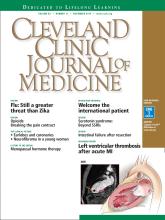Article Figures & Data
Tables
Scenario Challenges for the patient Challenges for the clinician A Chinese woman is self-referred to the clinic for treatment of multiple chronic medical problems managed by several providers in China over the last 10 years. The patient speaks a rare Mandarin dialect, has minimal available medical records, and due to mistrust of her home healthcare system, refuses to provide names of prior healthcare providers. Difficulties with communication in a foreign setting
Possibly unrealistic expectationsDifficulties obtaining an accurate medical history
Difficulties establishing local care provider for continuity of managementA man from India is admitted for complicated vascular surgery. During the preoperative evaluation, he tests positive for tuberculosis and is ultimately diagnosed with multidrug-resistant tuberculosis. Communicable disease must be under control (noninfectious, on effective therapy) before patients can be allowed to travel (eg, return home) New diagnosis must be managed effectively before surgery
Patient may need to remain at medical center for prolonged time (until no longer infectious)
May incur additional costs to medical center and public health
Finding expertise to manage multidrug-resistant tuberculosisA Saudi Arabian businessman arrives for his annual physical. He declines to see a female provider and demands to work with all-male staff (from desk staff to nursing staff to providers). Acclimatizing to different social cultural norms Accommodate patient care needs without imposing unrealistic expectations on other healthcare staff and medical center A female migrant worker presents to the county health department for a health evaluation and is diagnosed with HIV/AIDS and unstable angina requiring emergency admission to the local hospital. Need for emergency care in a potentially unfamiliar environment
Diagnoses that are life-limiting while away from home
Fear of deportationPotential difficulty disclosing diagnoses and obtaining informed consent
Lack of documentation and insurance raises admission and payment obstacles
Lack of continuity of care raises ethical concerns regarding long-term management (drug-eluting stent placement; necessity of HIV management)Consider preappointment orientation to the healthcare system Reconcile medications, assess any unknown medications and other treatments Assess available records, request more as needed prior to first appointment Ascertain provider to assume care upon return to home country, and establish connection Assess patient expectations and requests of care to prepare patient and clinicians for care process Determine how payments will be addressed and set expectations if payment is required before evaluations and treatment; involve the hospital and clinic business offices early as needed Strive for an empathic understanding of the patients’ expectations and cultural and religious norms Ensure staff at all levels have training in cultural competency that is durable and revisited Develop collaborative expectations Set expectations for duration and frequency of appointments Ensure there is a plan for receiving test results, particularly if the patient does not speak English Discuss that the plan of the clinician may not align with prior treatment recommendations from the patient’s home country care providers Understand process of consent for the patient—will the patient or a family member(s) give consent? Consider multidisciplinary, coordinated team visits with a prescheduled interpreter Include both male and female staff and clinicians (physicians and advanced practice practitioners) in the team to allow for flexibility of care Interpreters should be scheduled in advance or telephone/video interpreters set up on arrival to minimize schedule disruption and maximize the interactions of all staff with the patient Start transition of care early From the first visit, establish a receiving home country care provider if possible Some medications and treatments may be unavailable in the home country; this should be determined before initiating therapy that the patient would take after returning home Release of information to home country care provider should be obtained from the patient to allow medical records to be transitioned home as easily as possible Demonstrate gratitude for the opportunity to care for and learn from the patient Verbally thank the patient Tell the patient how caring for them has made you and your team better Teach patients and families Teaching provides an opportunity for deeper learning and mastery of a concept—potentially improving both clinician expertise and patient satisfaction/compliance Provide education on medical conditions and treatments; create a counseling appointment as needed for this Develop international relationships—these may establish rapport and potential international collaboration Collaborating with international care providers and institutions may generate opportunities for advancement of clinical practice, quality improvement, education, or research initiatives Collect data and experiences Perform internal quality improvement on the process of caring for international patients and use this to continually improve the process and experience; consider research initiatives to improve the evidence base and expand expertise






